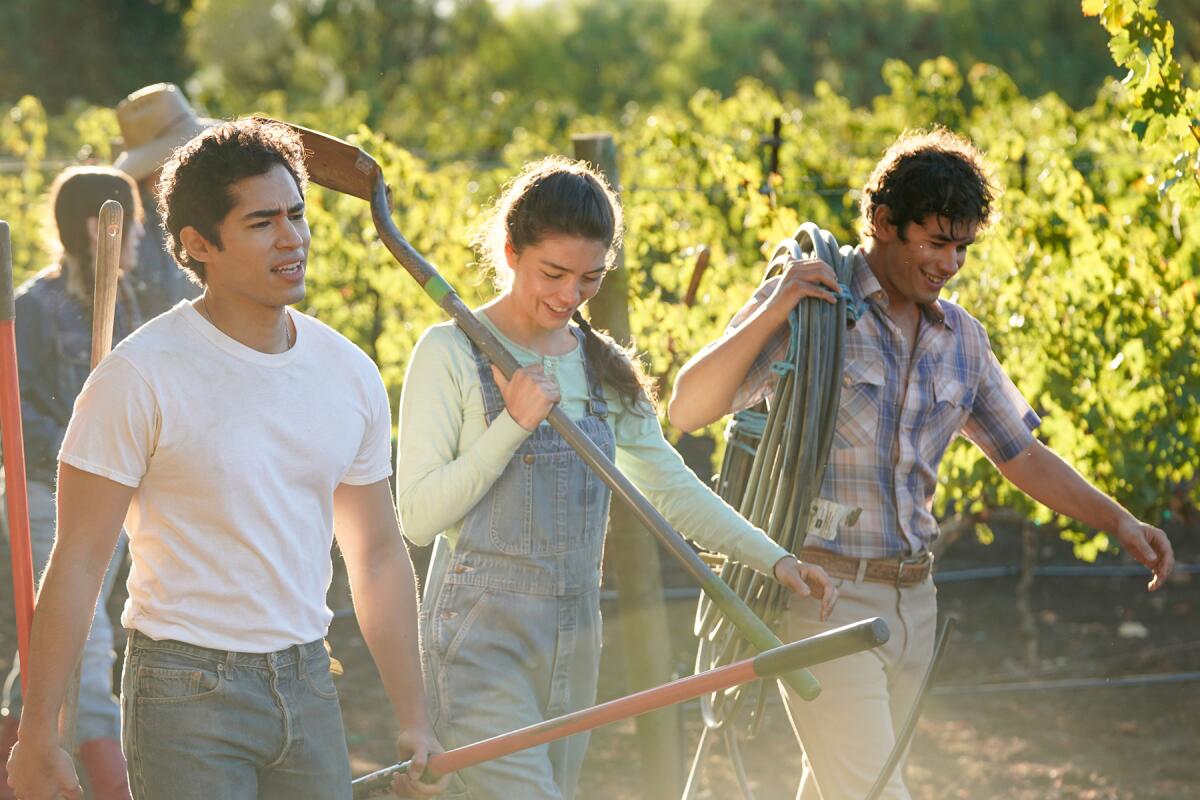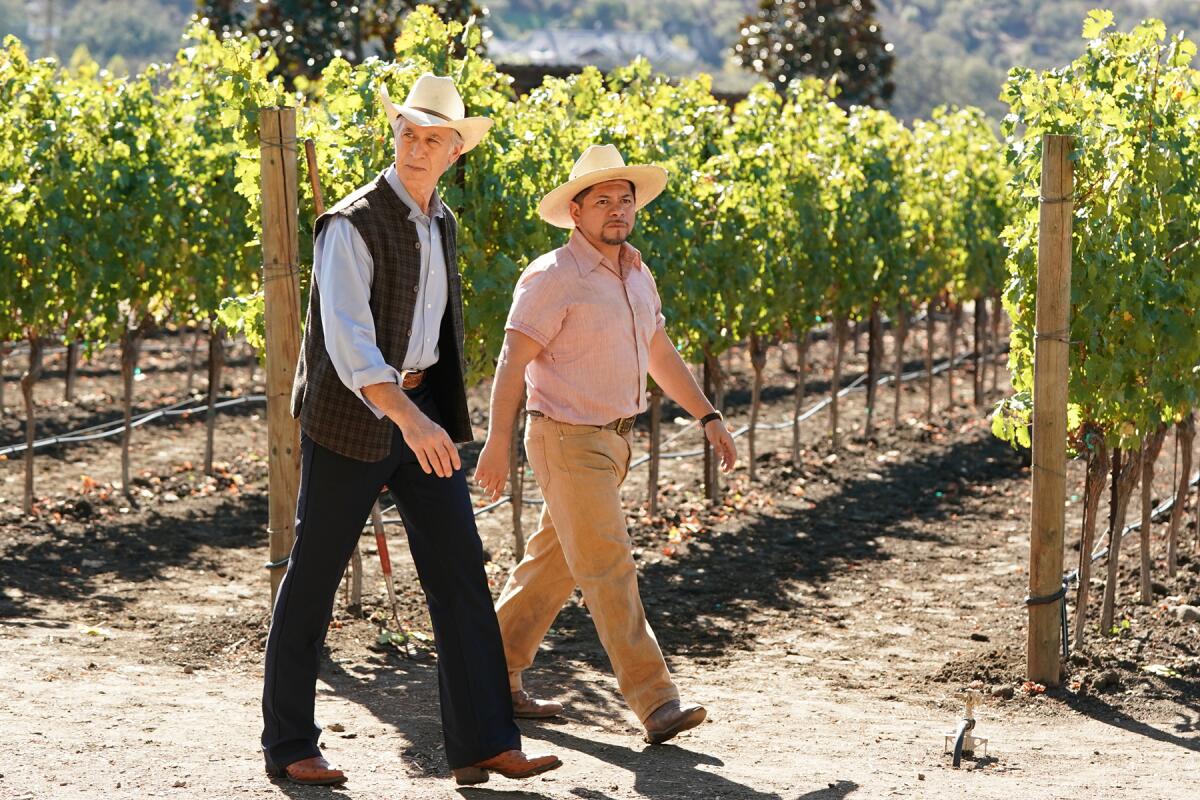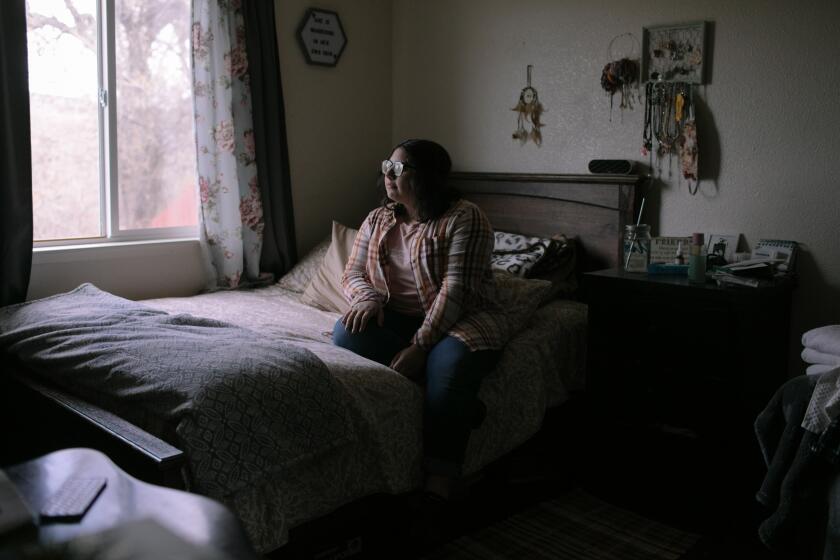‘Promised Land’ may be ABC’s ‘last serialized drama.’ What its fate says about network TV

- Share via
When Andres Velez got the script for an ABC series called “Promised Land,” he found the story and his character appealing. But there was one ingredient that really captured his attention.
“I said, ‘This is a network show and they’re going to have this much Spanish, with subtitles,” recalls Velez, who plays young Joe Sandoval, an undocumented immigrant who goes on to become the patriarch of a battling vineyard clan, played in his later years by John Ortiz. “For me the Spanish was what was so exciting.”
Katya Martin, who plays the younger version of Joe’s wife, Letty, agrees. “The scripts felt so seamless — of course this is in Spanish, this is just how these characters speak. They weren’t forcing it to make a point.”
“Promised Land,” created by Matt Lopez, broke ground when it premiered in January. Despite estimates showing that approximately 1 in 6 Americans speak Spanish (including bilingual and native speakers), a 2021 Times analysis showed that Latino representation in film and TV remains stagnant, falling further behind as the Latino proportion of the U.S. population grows. Latinos speaking Spanish are even rarer, and the major broadcast networks have been the slowest to adapt.
Sure, there was a bilingual PBS sitcom, “¿Que Pasa, USA?” in the 1970s, but with few exceptions Spanish remained largely absent from TV until recently, when first cable series (“Breaking Bad,” “Power,” “Graceland”) and then Netflix (“Orange Is the New Black,” “Narcos,” “One Day at a Time”) allowed creators to weave Spanish into their shows. The CW’s “Jane the Virgin” was a broadcast breakthrough, but ABC, CBS, NBC and Fox remained silent on the subject.
A Times analysis has found that Latino representation in film and TV has stagnated for a decade-plus, even as Latinos’ share of the population has grown.
“This is a first,” says Robert Thompson, director for Syracuse University’s Bleier Center for Television and Popular Culture, pointing to the strong ratings generated for years by Univision and Telemundo.
“I don’t know if it was audience prejudice or perceived prejudice from executives thinking, ‘They won’t watch shows with subtitles so we won’t show it,’” Thompson says, adding that streaming has been proving them wrong for years. (Just look at how popular “Squid Game” Halloween costumes were last year.) “The reaction shouldn’t be, ‘Isn’t this amazing,’ but, ‘Isn’t it amazing it took them so long?’”
For Manuel Uriza, a veteran Mexican American actor who also serves as “Promised Land’s” dialect coach and culture advisor, the opportunity felt like a rare gift. “We were all so happy and amazed that the network was willing to let the Spanish be in the show,” Uriza says. “Matt kept pushing to allow these characters to present themselves as they are. We were being seen as real people.”
Ultimately, however, David Craig, clinical professor of communication at USC, argues that breaking down barriers on broadcast networks means less than ever. “This has less import culturally, since broadcast and even cable networks are dying out during this rapid shift to streaming.”
Thompson agrees, saying the days when broadcast comedies like “The Jeffersons” and dramas like “Hill Street Blues” took real chances are long gone. “Broadcast networks are no longer the test kitchen of television,” he says. “They now do the most traditional stuff: crime procedurals and reality TV. The real innovation is in cable and streaming.”
Craig says it’s pressure from streaming that prompted broadcast and cable to finally tap into underrepresented and marginalized communities — though he adds that they’re quickly discovering that there’s no monolithic Latino audience that will automatically come running when Spanish is spoken. (He adds that streaming offerings provide multiple translations and dubbing services, which is another advantage.)
ABC proved to be anything but nirvana for “Promised Land,” after all — just five episodes in, the network had seen enough, shifting the remaining five episodes to Hulu. (Executives at ABC and Hulu would not discuss the show.)
“It’s a little discouraging that broadcast television, which is holding on [for] dear life to the sense of being the last remnant of mass culture, decided after five episodes that this program needs to be relegated to streaming,” Thompson says.

While that move is perceived as a demotion and certainly stung, Lopez says he’s mostly grateful for a second chance at life on another platform, an opportunity that didn’t exist a decade ago.
“I would not have minded being on Hulu from the start because there are more and younger viewers there,” he says. “Our No. 1 demographic on ABC was viewers over 50 because that’s who’s left watching broadcast.”
Lopez believes “Promised Land’s” failure to find an audience was less about Spanish and subtitles than about the soapy show’s serialized nature. “Folks at ABC have told me that ‘Promised Land’ may be the last serialized drama on ABC,” he says. “Their research shows that broadcast viewers want closed episodes of medical, police or legal shows.”
He believes serialized shows are ideal for streaming because audiences like bingeing those shows. “They don’t want to wait a week to find out what happened,” he says, adding that Disney Star+ is waiting to release the show in Latin America until it can drop all 10 episodes simultaneously.
Despite “Promised Land’s” short tenure, Lopez says broadcast should still be open to Spanish speakers on their procedurals. “Latinos are the fastest-growing television audience and watch more live TV,” he says. “Look at the ad rates that Telemundo and Univision command.”
Ultimately, by hiring Latino writers and bringing on Uriza as a culture advisor, “Promised Land” went beyond most shows, on any platform, in its quest for accuracy.
Series from “Breaking Bad” to “Narcos” have been castigated for shortcomings in the writing and accents. (The former also cast non-Latinos in crucial Latino roles, earning it online derision as a “Hispanic minstrel show.”)
“Often people think, ‘Oh, it’s Spanish so it’s all the same,’ but it’s really not,” Martin says.
When it feels as though the creators don’t care, Spanish-speaking viewers get distracted and turned off. “For English speakers it would be as if a show was set in the South but everyone had New York accents,” Velez says. “Details are important.” (While specificity is vital, Velez, who was born in L.A. to Colombian and Cuban parents, says it shouldn’t matter that the cast of “Promised Land” isn’t entirely Mexican. “How many questions does Benedict Cumberbatch get about not being from Montana?” he asks. “It’s not a fair question.”)
The conflict over ethnic studies reveals painful truths in Paso Robles.
Uriza, who has acted on “Better Call Saul” and “Narcos,” says those shows appear to rely on Google Translate, which quickly creates problems. “I would try to massage my lines and say to the producers, ‘This sounds Colombian, not Mexican,” he says.
Lopez, who is of Cuban descent, relied on Uriza for all sorts of details, especially with slang and colloquial usage: Spanish has several words for “wall” but people use “muro” for the one separating the U.S. from Mexico. Lopez also had a line where a character said his name was Guillermo but he went by Billy because it sounded “more American”; Uriza told him Mexicans, living on the same continent, viewed themselves as American and changed the line to “mas gringo.”
Uriza sometimes had to correct even Mexican American writers. “They speak Spanish perfectly, but it’s still not the Spanish they speak in Mexico — one time a writer said, ‘I’m from East L.A. and I never heard that phrase,’” he recalls.
Those behind “Promised Land” hope other shows follow in its footsteps, no matter what language and community is represented. “I think the cultural coach will start to repeat as a position,” Uriza says.
“Investing in that expertise,” Martin adds, “is so important.”
More to Read
The complete guide to home viewing
Get Screen Gab for everything about the TV shows and streaming movies everyone’s talking about.
You may occasionally receive promotional content from the Los Angeles Times.







